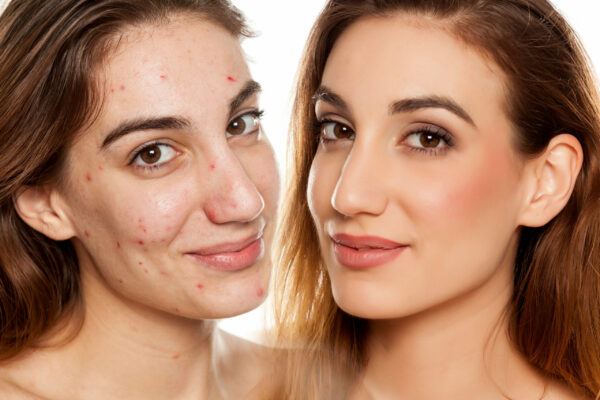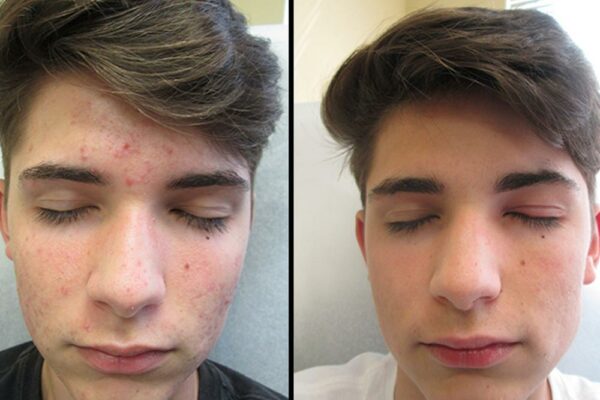Does your acne need treating? Our expert dermatologists can help remove your acne permanently.
TREATING ACNE IN LONDON
If acne is affecting your life, then the Harley Street Dermatology Clinic can provide both medical and laser acne treatment services here in our London acne clinic. Our consultant acne dermatologists can offer you expert treatment with a very good chance of permanently eradicating your acne.
Acne, also known as: cysts, pimples, boils, furuncles, blemishes, spots, zits, blackheads, or whiteheads, is an adolescent and adult skin condition that affects the face and body with visible abrasions, pimples and redness.
Below are the before and after images of patients who have had acne treatment at the Harley Street Dermatology Clinic. We hope you will agree that the results can be quite breath-taking. Don’t let acne dominate your life, get in touch and let us take care of your skin.
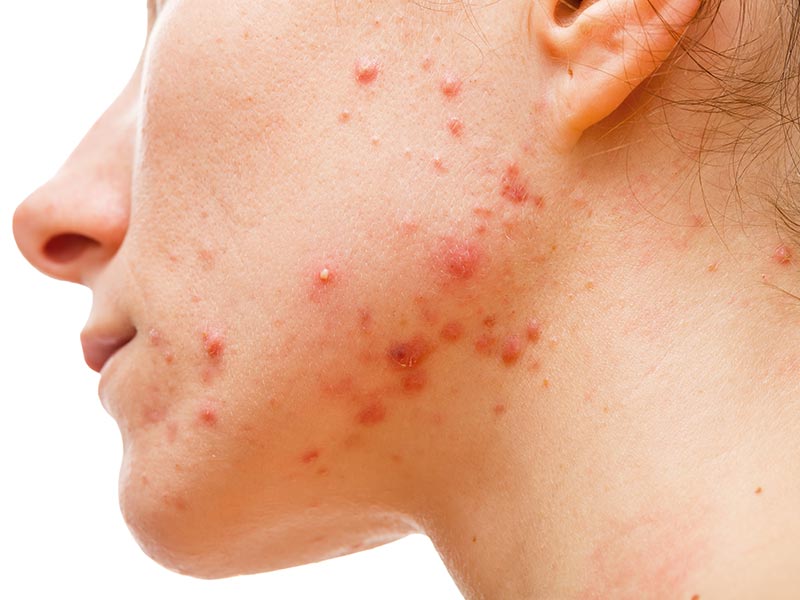
ACNE TREATMENT BEFORE AND AFTER
Acne usually gets better over a year or two, so the first line of treatment is to simply suppress the inflammation until the acne disappears naturally. Treatment might involve lotions or tablets such as antibiotics or hormone suppression in the form of a contraceptive pill (for females only). However, acne that is very disfiguring, scarring or long-standing is classed as severe, and requires stronger medication. We are able to prescribe a drug which offers a good chance of a cure for acne – see before and after images below.
We offer a range of acne treatments for those who suffer from acne, but as it is a complex condition with varying levels of severity, our Dermatologists will advise you on the most appropriate treatment plan for you during your consultation. We will often recommend a staged approach over a period of time where each stage will produce some improvement and together they will produce a worthwhile, sustained improvement. Your consultant will discuss with you the benefits and potential side effects of each treatment that might be suitable for you, enabling a joint decision about how to care for your skin to be reached.
Our Acne Dermatologists at London’s Harley Street Dermatology Clinic can offer effective, specialist acne treatment to patients to help cure or control their disease. For more information on acne, please see the British Association of Dermatologists website acne advice leaflet.
Medical Acne Treatments
The first line of treatment in many acne cases is to simply suppress the inflammation until the acne disappears. This treatment might involve lotions or tablets such as topical retinoids, oral or topical antibiotics or hormone suppression in the form of a contraceptive pill (for females only). The Harley Street Dermatology Clinic is able to prescribe an oral medication which has a good chance of clearing up acne.
Laser Acne Treatments
Lasers can be used to treat the redness and thread veins which are commonly associated with acne and acne rosacea. Acne laser treatment works by using a powerful light that destroys the bacteria that causes acne as well as removing blood vessels which cause redness. Lasers stimulate collagen production, kills bacteria and reduces the production of sebum from sebaceous glands in the skin. This is a safe and non-invasive treatment and a course is recommended. Lasers are also able to rejuvenate the skin, creating small columns of treated tissue amongst the healthy tissue to promote healthy looking skin.
ARRANGE A CONSULTATION
Arrange a consultation with one of our expert dermatologists today.
WHAT IS ACNE?
Acne is one of the most common skin conditions in the UK which affects most people at some point in their lives, however, severity and longevity of the condition varies. Acne is an inflammatory skin condition which leads to oily skin and the development of spots, including blackheads and whiteheads, on the skin. For many, acne only lasts for a short time during puberty when hormone levels are changing, however, for some, the effects of acne last much longer and can bring pain, scarring, and embarrassment.
Acne is characterised by blackheads, whiteheads and cysts. It affects the greasy and hair-bearing areas such as the face, chest and back. Acne is caused by a combination of overactive grease-glands, hormones and bacterial infection. As with most skin conditions, acne can affect one’s confidence and cause low self-esteem.
WHAT DOES ACNE LOOK LIKE?
The main symptom of acne is the appearance of a large volume of spots on the skin. Acne can develop on the face, back and chest and is a combination of blackheads, inflamed spots, cysts and pustules. In some severe instances, the scalp, armpits and groin can also be affected. To avoid scarring, it is vital to treat acne before this stage.
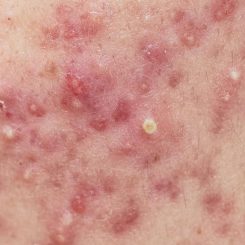
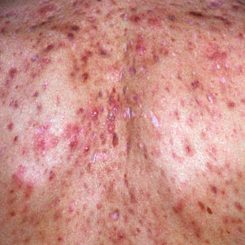
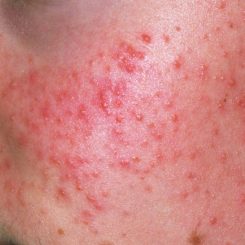
HOW MIGHT ACNE AFFECT ME?
Mild or moderate acne affects both your physical body and psychological well being.
PHYSICAL EFFECTS OF ACNE
Severe acne might leave scarring which can be pit-like, crater-like or bumpy. This type of acne may require more thorough acne treatment to ensure the skin is as blemish-free as possible. Click here for information relating to acne scarring treatment.
PSYCHOLOGICAL EFFECTS OF ACNE
Naturally, blemishes, marks or pimples around our faces can make us conscious about how we appear in front of people and this can impact both our confidence and mood.
INTERESTING FACTS ABOUT ACNE YOU MAY NOT KNOW
#1 – THERE IS ONLY ONE WAY YOU CAN GET A PIMPLE
There is actually only one way you can get a pimple through acne. A pimple occurs on the skin when your sebum oil glands produce too much sebum and in combination with dirt and dead skin cells on your skin, your pores and hair follicles become blocked. This causes a buildup of bacteria and pimple breakouts in areas where the pores are blocked on your skin.
#2 – SUNSHINE HELPS ACNE
Exposure to sunshine can help with how your skin deals with acne. Typically, you’re recommended up to 20 mins of sun exposure. You should use oil-free high SPF sunscreen to ensure skin protection from the sun. Sun helps the body to produce vitamin D, which contributes to skin cell growth, repair, and metabolism, helping the skin to recover from acne and acne scarring, complementing acne and acne scarring treatment programmes you dermatologist has implemented for your skin.
#3 – CONSISTENCY IS KEY WHEN TREATING ACNE
Impatience is one of the biggest contributors to failing to deal with/treat acne. Often, if we do not see immediate results when treating acne, we give up our skincare routine or course of treatment and look for the next solution. We are sometimes very close to breaking the acne breakouts or managing the root cause at this point and this is why maintaining the course of treatment for acne is important in order to solve your acne problem.
#4 – DAIRY HAS BEEN PROVEN TO IRRITATE ACNE
While not always the case, recent research has found that dairy products can trigger acne. This is the result of artificial hormones that are added to the cow’s diet and milk supply. The hormones used in these diets can offset the hormones in your own system, which is the likely cause of the acne breakout from dairy products.
#5 – WATER HAS INDIRECT BENEFITS FOR ACNE
There is an ongoing debate as to whether water helps with the treatment of acne. Water has many benefits for your skin from providing hydration to cleansing the skin from dirt, dead cells and other bacteria. Water also reduces the toxins in your skin, which helps to remove potential irritants that will cause acne breakouts on your skin.
#6 – DIETS CAN CAUSE ACNE (ONLY IF THEY CONTAIN SUGARS)
A lot of research suggests that diets cannot contribute to acne irritation or breakouts, however, studies show that foods that have glyceric properties and are high in sugar are absorbed quickly into the bloodstream. This increases your blood sugar levels and increases oil production on the skin, which is an indirect impact on acne on your skin.
#7 – THERE IS NOT ENOUGH RESEARCH TO SUGGEST STRESS CAUSES ACNE
Often, it is believed that stress causes acne breakouts on the skin. Unfortunately, there is not enough medical research to suggest that stress can cause acne. Additionally, the research available has not clearly defined stress as a cause of acne breakouts.
#8 – 80% OF THE POPULATION WILL GET ACNE
Acne will affect at least 80% of the UK population, so the likelihood of getting acne during hormonal changes within your body such as adolescence is extremely high. In this case, ensuring your skincare routine, diet and general skin health is good ensures that you are safeguarding your skin against acne breakouts.
#9 – MAKEUP CAN CAUSE ACNE BREAKOUTS
Unfortunately, yes, makeup products can cause acne breakouts. Makeup has the ability to clog the pores on the skin and hair follicles which will cause the buildup of sebum oil within the pores. Additionally, makeup with mineral oils can also clog the pores and cause breakouts of acne from within the hair follicles.
ACNE TREATMENT PROCESS
WHY CHOOSE THE HARLEY STREET DERMATOLOGY CLINIC?
When you have a chronic skin condition that will require ongoing treatment, having the right dermatologist is especially important. We want you to feel confident that we’re providing you with the best possible care, and to always feel as comfortable as possible with your dermatologist.
The Harley Street Dermatology Clinic specialises in conditions affecting the skin, hair and nails. Our goal is to provide all the care that you need when you’re experiencing these kinds of problems. We want to make it easy for you to access the best quality treatment and support in London.
The clinic is conveniently located in Central London, so it’s easy to visit us if you need to see a dermatologist. You will find yourself in a very comfortable and welcoming environment. We have created a relaxing space where you will receive the highest quality of care. We are regulated by the Care Quality Commission, are part of the British Association of Dermatologists and are top rated by patients of Doctify so you can be sure of safe and effective treatment with us.
WHAT OUR PATIENTS SAY ABOUT US:
There are no reviews on your Google platform.
CONTACT US
Address
The Harley Street Dermatology Clinic
47- 57 Marylebone Lane
London
W1U 2NT
Telephone: 020 3322 7852
Email: [email protected]
Opening Hours
Monday: 8:00am – 6:00pm
Tuesday: 8:00am – 6:00pm
Wednesday: 8:00am – 6:00pm
Thursday: 8:00am – 6:00pm
Friday: 8:00am – 6:00pm
Alternate Saturday: 10:00am – 2:00pm
Sunday: Closed
REQUEST A CALL BACK
Please fill in this form and one of our team will give you a call back to arrange a consultation with one of our expert dermatologists.
Acne Case Study
STARTING TREATMENT
Before starting treatment, I had to have another appointment with Dr Friedmann. This time blood tests were taken to check I wasn’t pregnant. Falling pregnant on this medication is absolutely forbidden, with Dr F hammering that message home. The short of it is that it will deform the baby, so must not happen. Also anyone hoping to conceive soon after will have to wait for two menstrual cycles before they can.
Liver and cholesterol is also checked through the blood and is then monitored every eight weeks.
“Firstly spots get worse before they get better,” Dr Friedmann warns. Oh great!
“The way we temper that is to put you on a small dose for the first month and then increasing to the standard dose after a month. So you get a bit of a flair up the first four weeks, a little bit more the next three or four weeks and by eight weeks you’ll be back to how you are now. Or a bit better. And then the next eight to 12 weeks after that everything just fades away.”
To read more click on the links below:
DURING TREATMENT
It’s been another four weeks on acne medication , and things really aren’t as bad as I’d anticipated. In fact, in my case anyway, the dread I had about going on the medication was a waste of time. For months I’d weighed up what was worse; living with ugly and painful spots or all my skin flaking off (because I honestly thought the dry skin would be that bad). But apart from lips, which admittedly are pretty flaky, my skin hasn’t been any drier than normal.
I don’t know if that’s because my skin is never usually dry, or because my dose isn’t too high, but whatever the reason I’m really happy with it. Dr Friedmann says side effects shouldn’t kick in now, as the dose won’t be changing. I’ve been using Dermalogica’s Active Moist religiously and the Skin Hydrating Masque twice a week, which has proven to be great.
To read more click on the links below:
So 60mg a day is going well. So well in fact, I’m kicking myself that I didn’t up the dose from the very start. My lips have got a little flakier, especially around the edge, and my chin shows signs of dryness, but apart from that everything has remained the same.
While the side effects have all been more than manageable, I am looking forward to the end of the Roaccutane course. Firstly I want rid of peeling lips. Secondly l can’t wait to be clumsy again – like catch my hand on the top of a drawer, walk into something or scratch my arm – and not be left with a visible mark where a chunk of skin has been taken out. Honestly I have the arms and legs of an 11-year-old boy who has been jumping about the place.
To read more click on the links below:
FREQUENTLY ASKED QUESTIONS
HOW LONG DOES ACNE LAST?
Acne usually gets better over a year or two, so the first line of treatment is to simply suppress the inflammation until the acne disappears naturally. Treatment might involve lotions or tablets such as antibiotics or hormone suppression in the form of a contraceptive pill (for females only).
However, acne that is very disfiguring, scarring or long-standing is classed as severe, and requires stronger treatment. There are drugs that offer a good chance of a cure for acne.
Our Acne Dermatologists can offer effective, specialist acne treatment to patients to help cure or control their disease.
WHAT CAN I DO IF I HAVE ACNE?
Consultant dermatologists have years of experience in the assessment, diagnosis and treatment of acne. An appointment with one of our trusted experts is likely to be the most effective way to treat your acne. Sadly, acne cannot yet be cured, but it can be controlled with treatment.
WHO IS AFFECTED BY ACNE?
Acne is very common in teenagers and younger adults. About 80% of the UK population between 11 and 30 are affected by acne. Acne is most common in girls from the ages of 14 to 17, and in boys from the ages of 16 to 19.
Most people have acne on and off for several years before their symptoms start to improve as they get older. Acne often disappears when a person is in their mid-20s. In some cases, acne can continue into adult life. About 3% of adults have acne over the age of 35.
IS ACNE CAUSED BY POOR HYGIENE?
No. Poor hygiene doesn’t cause acne. Cleansing your skin daily and exfoliating weekly can help prevent pores from becoming clogged, this approach is useful for both people with and without acne.
IS ACNE HEREDITARY?
Yes, acne is known to run in families, so if your mother and father suffered with acne, you are more likely to.
WILL ACNE GO AWAY ON ITS OWN?
Acne affects most people at some point during their lives and will usually go away on its own, usually during teenage years. If acne is still prevalent in adulthood, treatment may be needed to help to control acne.
WHAT CAN I DO TO HELP MY ACNE?
Things you can do yourself to help clear up acne include:
Washing the face once or twice a day with a mild soap and warm water. It is important not to over wash the face as this can irritate the skin. Wash your hair regularly and keep it off your face. Try not to wear too much makeup, and make sure it is completely removed before going to bed.
DOES TOOTHPASTE HELP TO CLEAR SPOTS?
It is not recommended to put toothpaste on your spots to help get rid of them. Even though toothpaste is anti-bacterial, it also contains substances which can damage or irritate your skin, making acne symptoms worse. Book a consultation with one of our expert dermatologists who can advise you on the right treatment for your skin.
